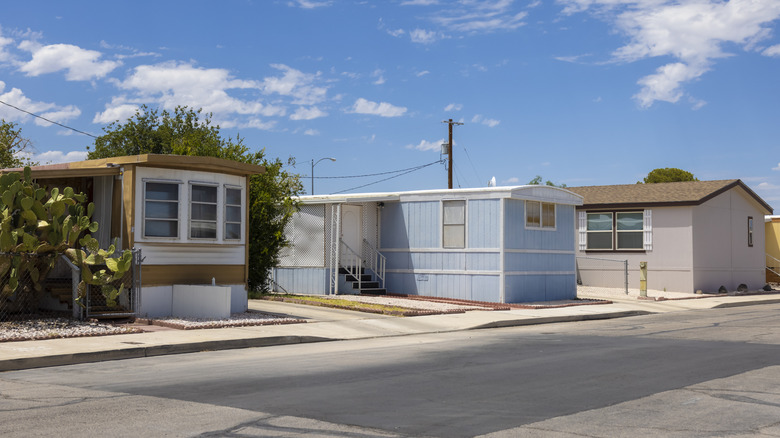What The Property Brothers Want You To Know About A Mobile Home Before You Buy
In a recent episode of "Chasing the West," a young couple looking for a ranch they could afford to buy turned to the Property Brothers, Jonathan and Drew Scott. The twin brothers have become HGTV superstars, hosting shows like "Forever Home," "Celebrity IOU," and "Brother vs. Brother." One of the properties the brothers showed the couple was a small ranch with a move-in-ready mobile home that they thought the couple might like because it needed no work. But there were a few things the couple needed to know about manufactured homes before they bought one. As Jonathan explained on HGTV via YouTube, one of those things is that mobile homes are "not the same quality as a custom home when it comes to construction."
Mobile homes, also called manufactured homes, are prefab structures built on a chassis and delivered to a home site. They can be moved, hence the word "mobile" in their name, but are most commonly placed on a lot permanently. These prefabricated homes became popular after World War II as inexpensive housing for veterans and their families. They cost less than half the price to build compared to a traditional home, and they now must meet the Manufactured Home Construction and Safety Standards. As Jonathan Scott pointed out, mobile homes have a reputation for being lower quality than a stick-built home; homeowners whose mobile homes were built before the standards were set in the 1970s often complained of leaky roofs, bad wiring, and poor insulation.
Should you buy a mobile home anyway?
Among the things you need to consider before purchasing a mobile home is its age. Unfortunately, the 1976 standards didn't guarantee well-built mobile homes. In fact, there was an uptick in the number of inadequate homes built between 1985 and 1990, so the regulations were updated in 1994 and continue to be updated. Common problems in pre-1995 homes are air leakage, poor heating, and crumbling foundations. Almost all of the problems with pre-owned mobile homes, or homes built before 1995, involve inferior construction, as the Property Brothers pointed out. Aside from poor construction, homeowners in older neighborhoods limited to mobile homes may not own the land their house sits on and must pay monthly rent. Take this into consideration, as well as your home's geographical location and condition, when you plan on selling a mobile home.
Manufactured housing remains among the best sources for affordable housing in the U.S., and mobile homes are losing some of their stigma as cheap dwellings clustered in trailer parks. Newly manufactured homes are well-built, energy-efficient, and can withstand natural disasters as well as site-built homes. Despite this, manufactured homes are still viewed by some as undesirable additions to many communities. Their reputation as poorly built, unsightly homes that only economically disadvantaged people live in is unfortunate. As Jonathan Scott noted, they provide a reasonable solution to a housing need.

